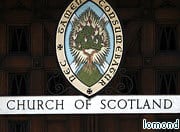A “substantial” number of members of the Church of Scotland’s General Assembly have signed motions of dissent over a decision to allow lesbians and homosexual men to serve as church ministers.
Some 120 commissioners objected to the Assembly’s move earlier this week which applies to clergy who have declared their homosexuality and were ordained before May 2009.
And 119 put their names to a motion of dissent against the creation of a theological commission which will look into the future ordination and training of gay and lesbian clergy.
Opposition
Although some of the names overlap on both motions, a Kirk spokesman said there were different names on each one.
Meanwhile a Church of Scotland minister in the Highlands, Revd Roddy MacRae, has said he will leave the Kirk over the vote to allow homosexual clergy.
Revd MacRae called on his fellow evangelicals to “stand up and be counted”. He said of the Assembly’s decision: “It’s a sad day for Scotland. It affects every church and we really need to think through where we go from here as an evangelical body, for the glory of God and for the sake of the people of Scotland.”
Homosexual
The Assembly’s decision was taken on Monday despite a special commission showing 60 per cent of Kirk session members were against the move.
The Revd Steven Reid, chairman of Forward Together which is a group for evangelical members of the Church of Scotland, said that he was not surprised that a “substantial” number of members dissented.
He commented: “For many of us, it’s something that goes against the scriptures.”
The issue came to the fore two years ago when it was announced that Scott Rennie, a divorced father-of-one who lives with his homosexual partner, had been appointed as minister of a church in Aberdeen.
Liberalism
Earlier this week Revd Andrew Randall of Larbert Old Church said the decision by the Assembly ‘opened the door’ to “de facto revisionism” and would be a Trojan horse for liberalism.
But homosexual lobby group, Stonewall Scotland, was delighted. Director Carl Watt said: “Although we await further decisions from the assembly and details on the next steps, we hope that in 30 years’ time this will be regarded as a storm in a teacup.”

